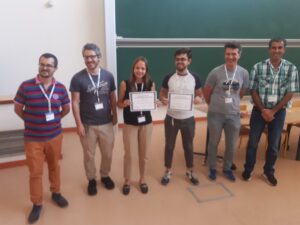Hautus-Yamamoto criteria for approximate and exact controllability of difference delay equations Sébastien Fueyo Jeudi 20 octobre, 14h, salle Coriolis (Galois). Abstract. The talk deals with the controllability of difference delay equations. Based on the realization theory developed by Y. Yamamoto for general infinite dimensional dynamical systems, we obtain necessary and/or sufficient conditions, expressed in the frequency domain, …
Category: Events and Seminars
Latest events and seminars related to McTAO team.
Journées du GdR MOA – Nice, October 11-14, 2022
Aller au contenu princMenu princi Dates et lieu Du 11 au 14 octobre 2022, Salle de Conférence du LJAD, Parc Valrose, Nice Inscription Gratuite, mais obligatoire sur le formulaire d’inscription. Date limite d’inscription : 18 juillet 2022 si vous souhaitez proposer une contribution orale. Date limite d’inscription : 19 septembre 2022 pour une inscription …
Séminaire McTAO : Robert Neel (Lehigh University) – 7 septembre 2022
Diffusion bridges and log-derivatives of the heat kernel in small time Robert Neel (Lehigh University) Mercredi 7 septembre, 11:00, salle Coriolis (Galois). Abstract. Consider a sub-Riemannian manifold with a sub-Laplacian and associated heat kernel and diffusion process. For two fixed points, we show that the small-time limit of the bridge process between the points, which is …
Best Paper Award at the CAO 2022 conference
The manuscript Considerations on Two-Phase Averaging of Time-Optimal Control Systems authored by L. Dell’Elce, J.-B. Caillau, et J.-B. Pomet and presented at the 18th IFAC Workshop on Control Applications of Optimization received the Best Conference Paper Award.
Séminaire McTAO : Nicolas Leclère (Université de Liège) – 1 juillet 2022
Orbital propagation around asteroid using the harmonic balance method Nicolas Leclère (Université de Liège) Vendredi 1 juillet, 11:00, salle Coriolis (Galois). Abstract. Interest in asteroids and small celestial bodies significantly increased in the last two decades, and, consequently, the number of space exploration missions increased as well. We propose to exploit a frequency-domain method, the harmonic …
Séminaire McTAO : Michael Orieux (Universitat Politécnica de Catalunya) – 20 juin 2022
Control of neural populations and Communication Through Coherence Michael Orieux (Universitat Politécnica de Catalunya) Lundi 20 juin 2022, 15:00, en ligne. Abstract. On many scales in the brain, from single neurons to populations of tens of thousands and more, oscillatory behaviors can be scouted. We are interested in the phase control of neural models in …
Séminaire McTAO : Dario Prandi (CNRS, L2S, CentraleSupélec)
Reproducing sensory induced visual hallucinations via neural fields Dario Prandi (CNRS, L2S, CentraleSupélec) Mercredi 25 mai 2022, 11:00, salle Coriolis (Galois). Abstract. Understanding the interaction between retinal stimulation and the cortical response in the primary visual cortex (V1 for short) is a significant challenge in improving our insight into human perception and visual organisation. In this talk …
Séminaire McTAO : Jean-Paul Gauthier (LIS, Université de Toulon)
Un gap universel pour le temps minimum des systèmes quantiques Jean Paul Gauthier (LIS, Université de Toulon) Vendredi 25 mars 2022, 11:00, salle Coriolis (Galois). Abstract. Pour le contrôle des systèmes quantiques, il existe un gap universel pour le temps minimum: l’unité de temps étant choisie judicieusement, le temps minimal pour connecter les deux points les …
Séminaire McTAO : Mario Sigalotti (Inria CAGE, Université Paris Sorbonne)
Ensemble control of quantum systems by adiabatic evolution Mario Sigalotti (Inria team CAGE, Laboratoire Jacques-Louis Lions, Sorbonne Université) Vendredi 4 mars 2022, 15:00, en ligne. Abstract. We first recall the basic properties of adiabatic perturbation and how the latter can be used to identify approximate control protocols between suitable initial and final states in quantum systems. We …
Stage M1/M2 (2021-22) – navigation maritime optimale
Proposition de stage M2 – Inria Sophia Antipolis Navigation maritime optimale En collaboration avec la société Sercel, l’équipe McTAO s’intéresse à la détermination de trajectoires optimales pour la navigation en mer. Une campagne d’acquisition sismique consiste pour un navire tractant un ensemble de câbles (bardés de capteurs) à parcourir une zone géographique déterminée. Quitte à simplifier, …
Séminaire McTAO : Ariadna Farrés (NASA, University of Maryland at College Park)
On the Geometry and Dynamics of Station-Keeping around Libration Point Orbits Ariadna Farrés (NASA, University of Maryland at College Park) Jeudi 27 janvier 2022, 11:00, en ligne. Abstract. Libration Point orbits have become relevant in space applications, as the regions around the L1 and L2 points in the Circular Restricted Three-Body (CRTBP) are ideal for space …
Séminaire McTAO : Luca Calatroni (CNRS, UCA)
Disclosing visual illusions via Wilson-Cowan-type dynamics Luca Calatroni (CNRS, I3S, UCA, Nice) Jeudi 16 décembre 2021, 11:00, salle Byron blanc Abstract. In this talk, I will discuss the reproduction of visual perception phenomena, specifically visual illusions, by means of Wilson-Cowan-type models of neuronal dynamics. In particular, we show that the celebrated Wilson-Cowan equations can reproduce a number of …
Workshop : Défauts d’observabilité des systèmes non linéaires – Inria Sophia Antipolis, 1-2 décembre 2021
Les défauts d’observabilité sont des configurations singulières dans lesquelles les informations à reconstruire sont inaccessibles. Cette situation assez commune dans les systèmes non-linéaires pose encore aujourd’hui de véritables difficultés. Ce sujet a émergé dans les travaux de plusieurs équipes spécialistes des méthodes d’estimation par observateurs, motivées par des applications variées. L’objectif de cette rencontre est de favoriser …
Séminaire McTAO : Tarek Hamel (UCA)
Deterministic observer design for vision-aided inertial navigation Tarek Hamel (I3S, UCA, Nice) Jeudi 25 novembre 2021, 11:00, salle Coriolis (Galois) Abstract. The purpose of this talk is to report results developed over the last three years for state estimation problems arising with unmanned mobile robots equipped with a monocular camera and a 3-axis gyrometer, complemented with either …



